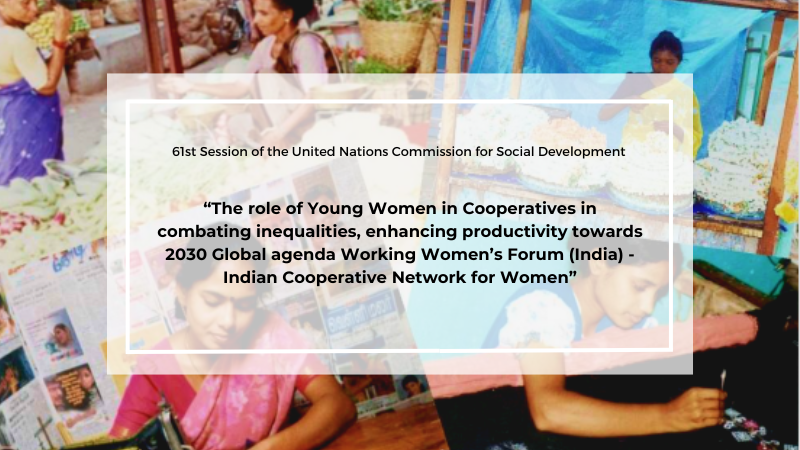Yesterday, Thursday 9 February, during the 61st Session of the Commission for Social Development (CSocD61), the WFO Member Organisation Indian Co-operative Network for Women (ICNW) hosted the virtual side event “The role of Young Women in Cooperatives in combating inequalities, enhancing productivity towards 2030 Global agenda Working Women’s Forum (India) – Indian Cooperative Network for Women”.
Moderated by Dr Nandini Azad, ICNW President and facilitator of the WFO Working Group on Cooperatives and member of the WFO Women Committee, the side event aimed to highlight the main challenges young women are facing globally and put a light on the critical role women’s cooperatives play in empowering young women by transforming them from atomized women workers into cooperative leaders.
The President of the World Farmers’ Organisation (WFO), Mr Arnold Puech d’Alissac, brought the global farmers’ perspective into the debate.
“Women are the backbone of rural economies” – WFO President
He opened his speech by remarking that “we should, first and foremost, celebrate and recognize the crucial role that women play in the farming sector both as farmers and as leaders of producers’ and cooperatives’ organisations” because “women are the backbone of rural economies and contribute to the development of the agricultural sector and rural communities in both developed and developing countries, always managing multiple roles and complex households. However, it is also true that women farmers’ contribution to the sector often remains hidden and unpaid.”
As stated in the WFO Policy on Women adopted by the WFO General Assembly in 2022, according to FAO women represent more than 37% of the world’s rural agricultural workforce. They represent approximately 50% of the world’s 600 million small-scale livestock keepers and 50 % of the labour force in small-scale fisheries.
Women and through them, families, play a key role in food systems.
The WFO President continued by underlying that “investing in the empowerment of rural women and girls can accelerate progress in rural development, farming, food security and nutrition, while at the same time improving women’s and girls’ resilience to risks, including those caused by climate change.”
Cooperatives are key to empowering rural communities, starting from women and youth
Mr Arnold Puech d’Alissac, also remarked how relevant agricultural cooperatives are in shaping the farming sector in different countries by gathering farmers, organizing, and empowering them both economically and socially, providing jobs opportunity, creating more inclusive, resilient and sustainable business models, thus contributing to the development of rural communities. Agricultural cooperatives are crucial also to empowering rural women and youth, including young girls.
“Empowering rural women, including girls, providing them with adequate skills and opportunities to increase their self-leadership, is a crucial step to advance the implementation of the 2030 Agenda for sustainable development” – he pointed out.
That is why youth and women’s empowerment has been recognized as one of the pillars to successfully implement the United Nations Decade of Family Farming (UNDFF), on which WFO is working together with other Farmers’ Organisations at the global and regional level, as well FAO and IFAD as joint Secretariat.
Young farmers, including girls, represent the future of agriculture.
The WFO President closed his speech by focusing on the new generation of farmers: “young farmers, including girls, need to be supported and empowered to be able to engage in farming and recognize it as a profitable, and therefore sustainable, profession and see themselves as entrepreneurs.”
All of us, all relevant stakeholders, must do our part to create an enabling environment for young people by adopting farmer-focused policies, designing tailor-made educational programs for young people, and facilitating access to resources, infrastructure, education, capital, and contributions. It’s something we do for all of us and the future of our planet.
